在中国旅游对外汉语教学课件 【Travel In China】
travelling-in-ChinaPPT课件

.
13
The special food you can try
Bào luó fěn 抱罗粉 Rice noodels
Shǔi guǒ chǎo bīng 水果炒冰 Fruit fried ice
.
14
.
9
sān yà wān 三亚湾 Sanya bay
.
10
yà lóng wān guó jiā sēn lín gōng yuán 亚龙湾国家森林公园 Yalong Bay/ Asian Dragon Bay national
Forest Park
.
11
wú zhī zhōu dǎo 蜈支洲岛 Wu zhizhou Island
.
17
.
18
.
19
.
20
Transportation
1.There is straight airline from Guangzhou Baiyun airport to Zhangjiajie
2.If you choose train,you can take train from Guangzhou Railway Station to Zhangjiajie Railway Station.
.
12
Transportation
1.There is straight airline from Guangzhou Baiyun airport to Sanya
2.If you choose train,you can take train from Guangzhou to Haikou (capital),and then take fast train to Sanya.
高中英语 Unit1 Travelling around Chinalanguage point课件
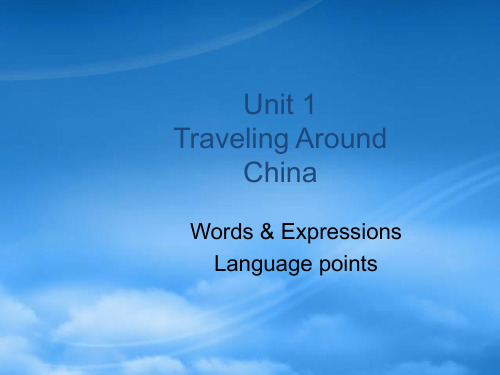
7。 route n.从一地到另一地旅行的路线 a sea route a land route 陆路 an air route the route of a journey 旅行路线 a train [bus] route 火车[公共汽车]路线 travel from Shanghai to Dalian by the route across the sea 从上海乘海轮去大连
3. on holidays= on vacation 度假 be [go] on holiday在休假[去休假] have a holiday 休假, 度假, 放假 She has gone to Canada on holiday(s)/vacation.
4. depend on/ upon sb./sth. * Health depends on good food, fresh air and enough sleep. * The town depends on the tourist trade. * I knew he wasn’t to be depended on. (信任、信赖) * The price depends on the quality. (: be decided by) depend on sb. for sth. * Children depend on their parents for all of their material needs.
Unit_5_Traveling_in_China--中国之旅IPPT精品文档

who is the conductor of the band?
she works as an conductor on a bus.
considerable a. 值得考虑的;相当大的,很多的 considerate/ consideration/ consider e.g. 买那辆奔驰牌汽车,他们花了不少钱。 They bought the Benz at considerable
electronic computers.
bear v. ---endure----stand 忍受 e.g. 我无法忍受人家叫我长时间地等候。
I can’t bear being kept waiting.
bet v. 打赌,敢断定(=be certain about sth./be certain that)
e.g. 她在那匹马上下了5美元的赌注。
She bet $5 on that horse.
你打过赌吗?
Do you ever bet?
我敢断定他不会来。
I bet he won’t come.
category n. ----sort---kind e.g. 那个图书馆有许多种藏书。
There are many categories of books in that library. conduct v. 领导,指导,引导 导游引领我们参观了博物馆。
Don’t live an aimless sort of life.
amount
the total of two or more quantities, a number , a sum, quantity 合计,总额, 数字
Unit 6 Traveling in China英语课件

• 2.) b. If you haven’t yet had your meals, why not have a try at this small restaurant. c. If you haven’t yet made up your mind, why not discuss it with your friends.
• 8. 1) suit individual needs 2) scenic spots 3) a personal letter 4) in writing 5) lovely 6) Unfortunately 7) extra rare
• 9. • 1.) • b. It is the wish of each family member to make sure that the family is happy. c. It is the duty of every employee to make sure that the company runs well.
The key to exercises
7. 1) responsible 2) service 3) vary 4) responsibility 5) satisfy 6) assist/serve/satisfy 7) assistant 8) variety 9) succeed succeed 10) successful 11) comfort 12) satisfactory 13) success 14) comfortable
The Key to the grammar
• 1. The beautiful farm should be visited in autumn. • 2. All the methods will be used in the experiment. • 3. The students might be troubled with the housing problem.
外国人学汉语经典教材TravelinChina英汉对照
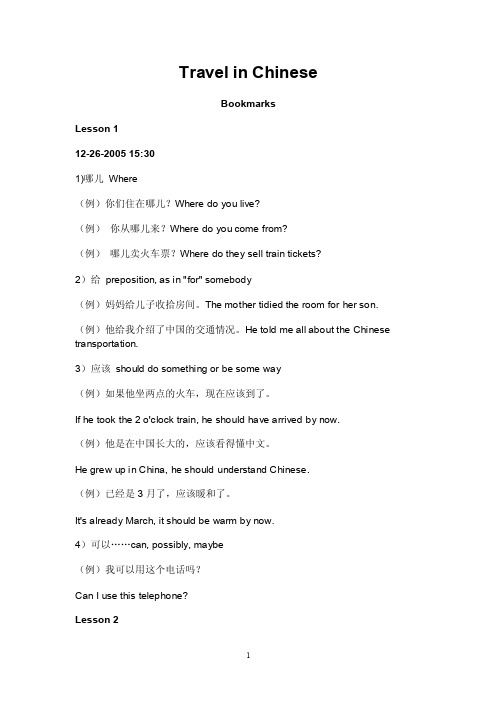
Travel in ChineseBookmarksLesson 112-26-2005 15:301)哪儿Where(例)你们住在哪儿?Where do you live?(例)你从哪儿来?Where do you come from?(例)哪儿卖火车票?Where do they sell train tickets?2)给preposition, as in "for" somebody(例)妈妈给儿子收拾房间。
The mother tidied the room for her son.(例)他给我介绍了中国的交通情况。
He told me all about the Chinese transportation.3)应该should do something or be some way(例)如果他坐两点的火车,现在应该到了。
If he took the 2 o'clock train, he should have arrived by now.(例)他是在中国长大的,应该看得懂中文。
He grew up in China, he should understand Chinese.(例)已经是3月了,应该暖和了。
It's already March, it should be warm by now.4)可以……can, possibly, maybe(例)我可以用这个电话吗?Can I use this telephone?Lesson 212-26-2005 15:341)是……的a way of emphasizing something about an action, like the time, location or way something has been done.(例)他是去年九月来的。
Emphasizing timeHe came last year in September.(例)他是来旅游的。
旅游汉语言文学知识PPT课件
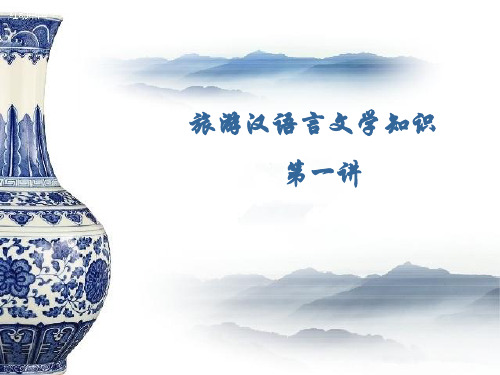
• 出现《徐霞客游记》
清
• 考据风席卷全国,文人又从广阔天地回到 了书斋中。
• 山水以外,花鸟画受到文人喜爱。
演讲环节测试
• 文化资源包括:古蜀文化资源:三星堆、 金沙遗址;三国文化资源:武侯祠、张飞 庙、翠云廊;名人文化资源:司马相如、 扬雄、李白、杜甫、“三苏”、郭沫若、 巴金;
• 在位11年, 五次大规模 地巡游。
• 封禅祭祀 咸阳到泰山有千里之遥。 • 宣德扬威,安定天下。 • 巡查政务,予以镇压。
• 秦始皇纵横捭阖的旅行,配合着金戈铁马, 留给后世帝王一个仰止的背影。
文人漫游,条条大道通仕途
• 在科举考试中,不仅看临场发挥,还要看 平时的声誉,如果得到当朝权贵与文坛巨 子的赏识,得以推荐,便能入仕为官。无 意中促成了一种风气——文人漫游。
旅游汉语言文学知识 第一讲
旅行是什么?
旅游是什么?
• 何为旅行? • 旅行不是一次出行, • 也不只是一个假期。 • 旅行是一个过程,一次发现。 • 是一个自我发现的过程。 • 真正的旅行让我们直面自我。 • 旅行不仅让我们看到世界, • 更让我们看到自己在其中的位置。
你觉得呢?
文学是什么?
长达14年的周游列国之旅。 • 携众弟子一直颠沛流离,宣传自己的政治
主张,潦倒疲惫,曾经七天断粮,但仍然 讲诵经史,弹琴作歌。 • 旅行,有了精神的支撑,才焕发光彩。
贬官游
苏轼 22岁荣登进士——杭州通判——密州,徐
州——湖州(乌台诗案)——黄州——登 州——惠州——儋州
寻找中国特色的古代旅行家
跟着古人去旅行
• 假如让你做一次心仪已久的长途旅行,可 以挑选一位古人做你的旅伴,你会选谁?
对外汉语教学课件教案PPT
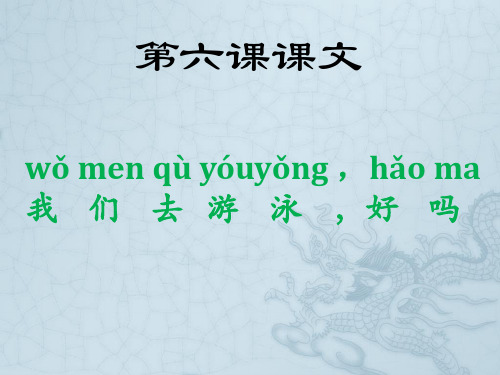
课文
wáng xiǎo yún : lí nà zuótiān de jīng jù zěn me yàng n 王 小 云 : 林 娜 ,昨 天 的 京 剧 怎 么 样? • lí nà: hěn yǒu yìsī jīn tiān tiān qìhěn hǎo wǒ men n 林娜 : 很 有 意 思 ,今 天 天 气 很 好, 我 们 qù yóu yǒng hǎo ma 去 游 泳 ,好 吗 ? wáng xiǎo yún : tài hǎo le shén me shíhòu qù 王 小 云 : 太 好了 ! 什 么 时 候 去 ? lí nà: n xiàn zài qù kě yǐ ma 林 娜: 现 在 去,可以吗? wáng xiǎo yún : kě yǐ 王 小 云 :可以。
第六课课文
wǒ men qù yóuyǒng ,hǎo ma 我 们 去 游 泳 ,好 吗
1
tā men shìnǎ guórén 他 们 是 哪 国 人?
tā men shìzhōng guórén
他们
是
中
国
人。
tā men zài zuòshén me
他们
在 做
什 么?
tā men zài biǎo yǎn jīng jù (表演:perform)
A: 林
娜 ,昨 天 的 _____ 怎
么
样
?
B: 很有_____。今天____ 很好,我 们去 _____,好吗 ?
A: 太
好 了 ,什 么 _____ 去 ?
B:
_____ 去 ,可 以 吗 ?
A: 可 以 。
《英文介绍中国旅行》课件
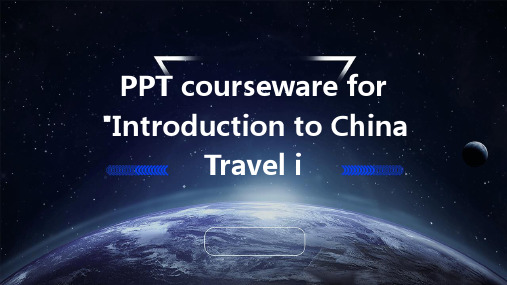
01
02
03
Transportation
Using public transportation or taxis, following traffic rules, and being mindful of pedestrian safety.
The warmth of the Chinese people
The Chinese people are known for their hospitality and friendliness, making visitors feel welcome and at ease.
The development of tourism in China: Tourism in China has a long history, dating back to the Tang Dynasty, when Chinese merchants traveled extensively throughout Asia and beyond. In recent decades, China's tourism industry has boomed, attracting both domestic and international tourists.
Introduction to Chinese tourist attractions
02
作为中国的象征,长城是世界文化遗产,以其壮丽的自然风光和悠久的历史文化吸引着无数游客。
长城
黄山
- 1、下载文档前请自行甄别文档内容的完整性,平台不提供额外的编辑、内容补充、找答案等附加服务。
- 2、"仅部分预览"的文档,不可在线预览部分如存在完整性等问题,可反馈申请退款(可完整预览的文档不适用该条件!)。
- 3、如文档侵犯您的权益,请联系客服反馈,我们会尽快为您处理(人工客服工作时间:9:00-18:30)。
UNIT AND LESSON TEMPLATE GUIDE
In order to facilitate a program to design curriculum, unit and lesson plans, the following diagram was developed to show the relationship between “Curriculum”, “Unit”, and “Lesson” as defined by STARTALK. Definitions of terms are included at the end of this document for additional reference.
GLOSSARY OF TERMS
1.Curriculum: An aggregate plan of study that maps out content, scope, sequence and levels of learning for a given subject matter. It outlines desired results regarding what a learner needs to know and be able to do upon reaching the end of the plan of study. This plan could span an entire degree program, a school year, a semester or academic term, a course, or a stand-alone program. In STARTALK, a curriculum refers to the program level plan of study.
2.Unit: A thematic organizer of a subset of the curriculum to be completed in a specific period of time. In a unit, topics are related and learning activities are logically sequenced to achieve stated objectives. A unit usually consists of a series of lessons which include instruction, practice, application and assessment.
3.Lesson: A building block of a unit that has clearly defined objectives to be achieved within a specified time frame. A lesson makes content accessible and should be designed and implemented in ways that are appropriate for students and reflect principles of second language acquisition.
Description
End of Unit Performance Tasks (How can students demonstrate what they have learned in this unit?) What culminating performance tasks will provide evidence that students have achieved the
stated learning objectives? Indicate how students will be assessed for each mode of
communication through interpretive, interpersonal and presentational performance tasks.
End of Unit St andards, The 5 “C’s” (How can students demonstrate what they have learned in
addition to Communication, i.e. Culture, Comparisons, Connections & Communities?)
Outline of Unit Lessons (The number of lessons will vary according to the timeframe for the unit theme. )
Week 1
Week 2
Week 3
Week 4
Week 5。
